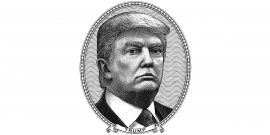The Flight of Fancy Election
According to Livy’s History, the Roman consul Publius Decius Mus sacrificed himself to the gods by “leap[ing] upon his horse and dash[ing] into the middle of the enemy” in a ritual that secured victory for his embattled army. One hopes the polemicist using Decius as a pseudonym in a much discussed broadside against Never Trumpers, having anonymously expressed an opinion with which somewhere north of 40 percent of Americans agree, is safe. The republic almost certainly will be.
That it will not—that all historical roads have converged on this one, not on the Civil War or the Second World War or the Cold War, but this road, right now, which is, in turn, “head[ed] off a cliff”—is Decius’ thesis. He consequently invokes the vivid image of “the Flight 93 election” in which the choices are to storm the cockpit and risk death (Trump) or to sit pat (Clinton) and perish for certain.
Those are stark choices indeed, and one of two possibilities is available. Either they are wholly detached from reality, in which case Decius has rejected prudence as the conservative virtue par excellence, or they are true, in which case Decius accepts the anticonstitutional and thus anticonservative proposition that the President straddles the Constitution like the Colossus stood astride the harbor at Rhodes.
In either case, the Flight 93 image indicates a regime diseased, one whose fate hinges on a single presidential election. That is never healthy and almost never reality. 1860 and 1864? Yes. But 2016?
Decius insists that it is only to “ordinary conservative” ears that the barreling-toward-the-cliff narrative sounds “histrionic.” Actually, conservatives have traditionally shied from the rhetoric of crisis because it almost always feeds what Bertrand de Jouvenel called “the Minotaur”: Power. Jouvenel explains: “And so it is that times of danger, when Power takes action for the general safety, are worth much to it in accretions to its armory; and these, when the crisis has passed, it keeps.”
The “general safety” is probably not much endangered now, what with the oceans and all, but Decius’ concerns run deeper: If conservatives, he says, are right about virtue, education, social norms, personal enterprise, Big Government, and national security, “then they must believe—mustn’t they?—that we are headed off a cliff.” (emphasis in original of course)
It may be worth observing that Decius’ regime is what Michael Oakeshott would call telocratic—directed toward substantive ends—rather than classically liberal, which is nomocratic, providing boundaries and rules that allow individuals to choose ends of their own.
Perhaps because of the urgency of these imperiled teloi, Decius says Burkean solutions are inadequate to the catastrophic gravity of the moment. (Might Robespierre suffice?) Decius consequently wonders at the “Pollyanna-ish declinism” of the Never Trumpers. “The obvious answer,” he concludes, “is that they don’t really believe” that things are really bad. There is a tautology in there somewhere. They are Pollyannas because they don’t think things are that bad, which is actually the definition of a Pollyanna and thus inhibits its own refutation.
In any event, if they believe such, “they should stick a sock in it.” Wait—is Publius Decius Mus actually Donald J. Trump or just channeling his manner of speech? No matter: Forbearing, for a moment, said sock, it may be worth asking whether the nation is actually headed imminently for a cliff and, if not, what purpose is served by suggesting it is.
The answer to the first question is that as long as conservatives persist in apocalyptic rhetoric that does not match the everyday experience of most Americans, they should not be surprised when disconnection results. The fact is that Barack Obama and Hillary Clinton do not have world-historical importance, and it is entirely possible, perish the thought, that ours are not world-historical times. The trends that rightly concern Decius are extensions of a path on which, especially with respect to cultural indicators, the bulk of the industrialized world has been gliding for more than half a century.
To Decius, the idea that this path might be rerouted only slowly and prudently, as Matthew Continetti sensibly suggests, is—figure this one out—“utopian and unrealizable.” What is apparently grounded and real, by contrast, is electing a President to do it for us. That brings us to the answer to the second question, Cui bono? Who benefits from exaggerating the sense of catastrophe?
Consider: Decius warns that “the tsunami of leftism that still engulfs our every—literal and figurative—shore has receded not a bit but indeed has grown.” This is absurd. The Speaker of the House is a thoughtful conservative with an operating majority. The Senate is in Republican hands. Several major countries have governments somewhere right of center.
Similarly, Hillary Clinton—she who is under attack from the Bernie Sanders crowd as insufficiently Progressive, she who stands accused of residing in the pocket of financial interests who fund her family foundation, who is widely thought to be running too cautious a campaign—is probably not, could we please face this, spending her nights concocting a “Progressive-left agenda” that includes “items few of us have yet imagined in our darkest moments.”
The motive of such inflationary rhetoric is often the accumulation of power. Its result always is. Note well the monomaniacal formulation of Trump: “I am your voice . . . I alone can fix it.” There is a bizarre detachment of conservatism from conservation here. All is change, oriented toward future ends. This requires power above all else: The power of He Alone Who Can Fix It.
Consequently, even granting arguendo that the cliff awaits, the essential question Trump presents is whether injecting an already inflamed presidency with political growth hormone is the answer. If that is the answer, the Constitution of the United States is not. It divides authority among three branches of government, led by a deliberative Congress whose will the President executes. Decius, apparently, would deepen the corruption of that regime by handing it to a strongman whose devotion to the Constitution stops at its phantom Article XII. Decius’ Constitution is thus far more Wilsonian and Progressive than the original. Woodrow Wilson might have anticipated Trump when he wrote of the President:
For he is also the political leader of the nation, or has it in his choice to be. The nation as a whole has chosen him, and is conscious that it has no other political spokesman. His is the only national voice in affairs. Let him once win the admiration and confidence of the country, and no other single force can withstand him, no combination of forces will easily overpower him. His position takes the imagination of the country. He is the representative of no constituency, but of the whole people . . . [The country’s] instinct is for unified action, and it craves a single leader. . . . A President whom it trusts can not only lead it, but form it to his own views.
There are, of course, thoughtful people who find Trump distasteful but Clinton unacceptable. But all of them should beware the rhetoric of crisis. “The election 2016 is a test—in my view, the final test,” Decius warns by way of conclusion, “of whether there is any virtù left in what used to be the core of the American nation.” Yes, it is a test. The test is whether we have the constitutional virtue—not the Machiavellian kind—remaining to resist the apocalyptic rhetoric of those who want us to believe it is the last one.


